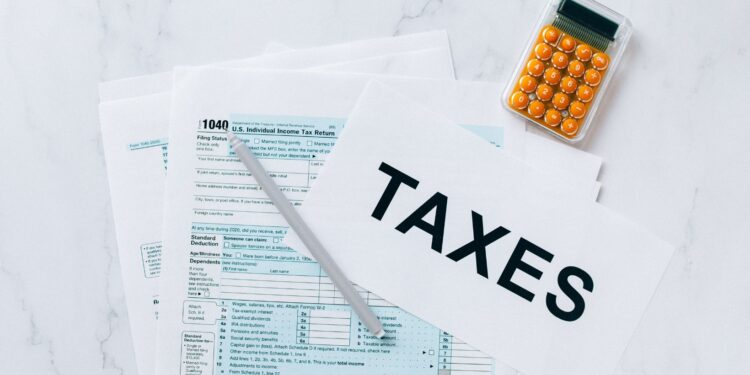Tax season has a way of creeping up on us, doesn’t it? One minute, it’s the start of the year; the next, April is knocking at the door, and you’re scrambling to gather documents, receipts, and income records. But what if tax season didn’t have to be such a headache? Imagine a tax-filing process that feels organized, stress-free, and even (dare we say) satisfying. The secret? It all comes down to adopting a few smart financial habits that make tax time a breeze.
If you’re ready to save yourself a mountain of stress next tax season, let’s dive into the habits that can make all the difference.
Keep Track of Everything: Organizing Your Financial Records
Let’s be honest, most of us could use a little more organization in our lives. When it comes to taxes, keeping detailed records isn’t just a good idea; it’s essential. Think about it: wouldn’t it be nice to have all your receipts, invoices, and financial documents in one place when tax time rolls around? Keeping these records organized can save you hours of searching and prevent those “where did I put that?” moments.

Need a boost to your record-keeping game? Tools like expense-tracking apps or a pay stub generator (if you’re self-employed or run a small business) are lifesavers. These tools help document income and expenses, making it easy to pull up what you need, whenever you need it.
Automate Income and Expense Tracking
Wouldn’t it be nice if your financial records organized themselves? While we’re not quite there yet, automation gets us pretty close. With the right tools, you can set up automatic income and expense tracking that saves you from manually entering every purchase, payment, or paycheck. For freelancers or small business owners, solutions such as a free paystub generator can streamline income documentation, making it easier to access what you need during tax season.
There are plenty of apps and software options out there that can connect to your bank accounts and automatically categorize transactions for you. Many of them even let you customize categories and tags, so you can easily find that business dinner or office supply purchase without digging through a mountain of receipts.
Automated tracking does the hard work for you, keeping a steady log of your financial activity. So when tax time comes, everything is already in place. It’s like having a personal assistant that keeps your finances tidy all year round.
Separate Business and Personal Finances
One of the most common tax-time blunders? Mixing personal and business finances. It can make figuring out what’s deductible a nightmare, not to mention raising red flags with the IRS. So, why not simplify things by keeping your personal and business finances separate?
Start by opening a dedicated business bank account. Use it for every business-related purchase, no matter how small. It’s easy to think “Oh, I’ll remember this later,” but when tax season arrives, will you? Using separate accounts (or even separate credit cards) for business expenses will make everything clear-cut. Plus, if you’re ever audited, you’ll have a clear paper trail.
This one simple habit helps keep your financial life organized and gives you a clear picture of your business’s performance. And the best part? It makes claiming deductions and credits so much easier!
Track Deductible Expenses Throughout the Year
Ever feel like you’re missing out on deductions? You’re not alone. One of the best ways to ensure you get every deduction you’re entitled to is to track these expenses as they happen, not just in a mad dash during tax season. Whether it’s office supplies, travel expenses, or even a home office, knowing what qualifies and staying on top of it can add up to significant savings.
Make it a habit to log deductible expenses right after they happen. This way, you don’t have to worry about forgetting them months down the line. If you’re a freelancer or run a small business, this might include anything from professional development courses to software subscriptions.
Need some help remembering what’s deductible? Most accounting software can help categorize these expenses, making it easy to spot what qualifies. This proactive approach to tracking expenses ensures you’re not scrambling at the last minute to find those missed deductions.
Schedule Quarterly Check-Ins (and Payments)
If you’re self-employed or own a small business, you know that paying taxes isn’t just a once-a-year thing. In fact, making estimated quarterly payments is often required. But even if you’re not obligated to pay quarterly, scheduling regular tax check-ins can save you from a huge bill in April.
At the end of each quarter, take some time to review your income, expenses, and tax obligations. Calculate what you owe, set aside funds, and consider making a payment. This approach doesn’t just save you from surprise tax bills—it also helps you manage your cash flow by breaking down what you owe into manageable chunks.

Consult a Tax Professional
Let’s face it, taxes can get complicated fast. The more income streams or deductions you have, the harder it can be to make sense of it all. That’s where a tax professional comes in. Having a pro on your side can make a world of difference, especially if you’re a freelancer, small business owner, or have complex finances.
Think of a tax professional as your guide through the tax maze. They can spot deductions you might overlook, help you understand tax laws, and provide insights on how to optimize your finances for future tax savings. Schedule a yearly check-in, or even a semi-annual review, to stay on top of changes in tax laws and make sure you’re maximizing every opportunity.
And if the idea of navigating tax law solo stresses you out, a pro can bring some much-needed peace of mind. Consider it an investment in reducing stress and ensuring accuracy.
Recap: Habits That Make Tax Season Smoother
So, what’s the takeaway here? Tax season doesn’t have to be a mad dash to find paperwork and crunch numbers. With a few smart financial habits in place, you can approach tax time with confidence, knowing you’re prepared and ready. Start by organizing your records, keeping personal and business finances separate, automating as much as possible, and tracking deductible expenses all year.
Scheduling regular check-ins and seeking professional advice can also take the pressure off, giving you the assurance that you’re on the right track. Tax season will never be a favorite time of year, but with these habits, it can definitely be less stressful and far more manageable.
So, ready to make a change? Start small, pick one or two habits and work on building them up. By next tax season, you’ll thank yourself for making the process easier, more efficient, and maybe even a little bit rewarding.











